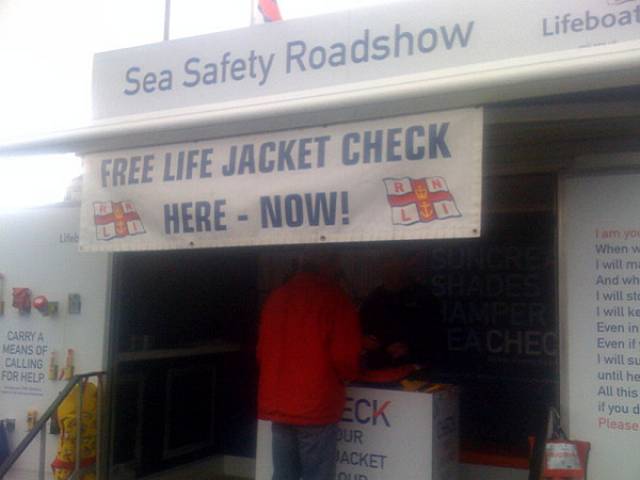Dun Laoghaire RNLI is making a timely warning this Bank Holiday weekend to all lifejacket owners to ensure the appropriate safety checks are carried out by a competent agent ahead of the main boating season.
The safety appeal comes following the results from a free lifejacket advice clinic held in Dun Laoghaire by the RNLI’s community safety team last weekend.
Of the 131 lifejackets checked, only 21% were found to be completely fault free.
The lifejackets were brought to the free clinic by a variety of boat users and were checked by experienced RNLI volunteers. While the RNLI offers sea safety advice it does not offer a pass or fail assessment on lifejacket servicing.
Just over half the units tested had the recommended crotch straps fitted that are considered vital to ensure that a lifejacket inflates correctly on the wearer and remains in place, keeping the wearer’s head above the water and helping to prevent fatigue.
There were numerous examples of life-threatening problems detected during the checks. Ninety of the units had out of date firing mechanisms and 23 had corroded gas bottles that risk incorrect inflation in an emergency.
Speaking following the clinic, Stephen Wynne, Dun Laoghaire RNLI Lifeboat Operations Manager said: ‘Although we are very pleased that more than 100 lifejackets were checked, the fault rate is extremely worrying when you think that anyone taking to the water needs and relies on a lifejacket should they get into trouble. As the main boating season gets underway, we are appealing to everyone thinking of going on the water to ensure that they not only have a lifejacket but that every user has their lifejacket checked by a competent agent. This is so important and could save a life.’
Other problems identified at the clinic included lifejackets that had already been fired (3), missing gas cylinders (3), missing firing mechanisms (3), bladder abrasion (3), holed bladder (3) and one unit that was so old it didn't inflate at all.
‘It is essential that the correct type of lifejacket is used depending on the planned activity’, added Peter Richardson, Dun Laoghaire RNLI Community Safety Officer. ‘Specialist activities such as offshore racing or cruising need lifejackets fitted with a spray hood, light and space for a personal locator beacon (PLB). People who do not fit a crotch strap to their lifejacket or who do not use it when fitted is risking their lives should they end up in the water’.
































































